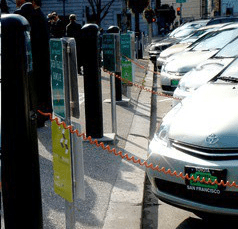 Electric vehicles (EVs) are not just a cleaner alternative to traditional diesel-fueled transportation – they could also be a more economically and commercially advantageous for businesses to add to their fleets.
Electric vehicles (EVs) are not just a cleaner alternative to traditional diesel-fueled transportation – they could also be a more economically and commercially advantageous for businesses to add to their fleets.
According to a new report released jointly by the Energy Savings Trust, The Climate Group and Cenex, if businesses deploy EVs in the right place using a solid strategy, they can benefit from a range of financial incentives, especially in the U.K., which provides both taxation benefits and up-front grants for the purchase of EVs.
Under the U.K. government's incentive program, cars with zero emissions (i.e., 100% electric) are exempt from paying the company car tax until 2015, and plug-in hybrid EVs would be taxed just 5%. The U.K. also expanded its plug-in car grant to focus on fleets and light-duty vans within London, which the report says ‘clearly strengthens the business case for EV deployment into fleets.’
In the U.S., the federal government provides a tax credit of between $2,500 and $7,500 for the purchase of an EV, depending on its battery capacity – an incentive President Obama is seeking to increase to $10,000.
Although the up-front cost of purchasing EVs is greater, these expenses pay for themselves over time and, in the long run, can result in substantial economic savings for businesses.
For instance, according to the report, it costs approximately one-quarter of the price to refuel an EV compared to a conventional vehicle. When total running costs of the vehicle are considered, EVs can result in a savings of 700 British pounds per vehicle per year compared with diesel transportation, when used in the right application, the report says.
In addition to the environmental and economic advantages, EVs also offer significant branding benefits to companies, the report notes. Not only are consumers demanding more sustainable products, but they are looking to companies to be environmentally responsible. EVs provide a clear benefit to corporate sustainability and image, so EV deployment is a smart public-relations move for any business.
The report warns, however, that companies intending to incorporate EVs into their fleets must have a solid, practical plan for doing so. Otherwise, the EVs could end up being both underutilized and criticized by employees, which could result in a future barrier to EV deployment.
Therefore, when making the decision of whether to switch to EVs, fleet managers must consider the total lifetime costs of each type of vehicle, fiscal influences and the company's location and routes, among other factors.
When done correctly, however, the incorporation of EVs into fleets can prove to be a financially sound – not to mention, environmentally responsible – decision for businesses.
“In today's tough economy, fleets need to have confidence that, operationally and financially, EVs add up,” says Nigel Underdown, head of transport advice at the Energy Saving Trust. “Our work shows that for certain operations, the business case for EVs is very strong indeed.”
The full report – EV20 Plugged-In Fleets – can be downloaded here.






